
The cinema of Italy comprises the films made within Italy or by Italian directors. Italy is one of the birthplaces of art cinema and the stylistic aspect of film has been one of the most important factors in the history of Italian film. As of 2018, Italian films have won 14 Academy Awards for Best Foreign Language Film as well as 12 Palmes d'Or, one Academy Award for Best Picture and many Golden Lions and Golden Bears.

Federico Fellini was an Italian film director and screenwriter. He is known for his distinctive style, which blends fantasy and baroque images with earthiness. He is recognized as one of the greatest and most influential filmmakers of all time. His films have ranked highly in critical polls such as that of Cahiers du Cinéma and Sight & Sound, which lists his 1963 film 8+1⁄2 as the 10th-greatest film.
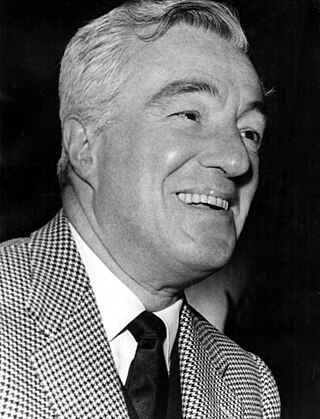
Vittorio De Sica was an Italian film director and actor, a leading figure in the neorealist movement.

Roberto Remigio Benigni is an Italian actor, comedian, screenwriter and director. He gained international recognition for writing, directing and starring in the Holocaust comedy-drama film Life Is Beautiful (1997), for which he received the Academy Awards for Best Actor and Best International Feature Film. Benigni was the first actor to win the Best Actor Academy Award for a non–English language performance.

Giovanni Rota Rinaldi, better known as Nino Rota, was an Italian composer, pianist, conductor and academic who is best known for his film scores, notably for the films of Federico Fellini and Luchino Visconti. He also composed the music for two of Franco Zeffirelli's Shakespeare screen adaptations, and for the first two installments of Francis Ford Coppola's The Godfather trilogy, earning the Academy Award for Best Original Score for The Godfather Part II (1974).

Amarcord is a 1973 comedy-drama film directed by Federico Fellini, a semi-autobiographical tale about Titta, an adolescent boy growing up among an eccentric cast of characters in the village of Borgo San Giuliano in 1930s Fascist Italy. The film's title is a univerbation of the Romagnol phrase a m'arcôrd. The title then became a neologism of the Italian language, with the meaning of "nostalgic revocation". The central role of Titta is based on Fellini's childhood friend from Rimini, Luigi Titta Benzi. Benzi became a lawyer and remained in close contact with Fellini throughout his life.
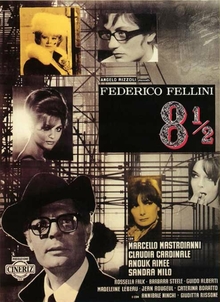
8+1⁄2 is a 1963 Italian surrealist psychological comedy-drama film directed and co-written by Federico Fellini. The metafictional narrative centers on Guido Anselmi,, a famous Italian film director who suffers from stifled creativity as he attempts to direct an epic science fiction film. Claudia Cardinale, Anouk Aimée, Sandra Milo, Rossella Falk, Barbara Steele, and Eddra Gale portray the various women in Guido's life. The film is shot in black and white by cinematographer Gianni Di Venanzo and features a score by Nino Rota, with costume and set designs by Piero Gherardi.
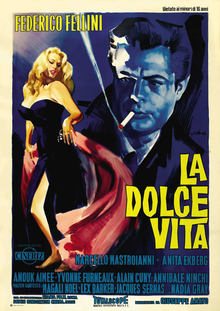
La dolce vita is a 1960 satirical comedy-drama film directed and co-written by Federico Fellini. The film stars Marcello Mastroianni as Marcello Rubini, a tabloid journalist who, over seven days and nights, journeys through the "sweet life" of Rome in a fruitless search for love and happiness. The screenplay, written by Fellini and three other screenwriters, can be divided into a prologue, seven major episodes interrupted by an intermezzo, and an epilogue, according to the most common interpretation.

Giuseppe Avati, better known as Pupi Avati, is an Italian film director, producer, and screenwriter. He is known to horror film fans for his two giallo masterpieces, The House with Laughing Windows (1976) and Zeder (1983).

Nights of Cabiria is a 1957 drama film co-written and directed by Federico Fellini. It stars Giulietta Masina as Cabiria, a prostitute living in Rome. The cast also features François Périer and Amedeo Nazzari. The film is based on a story by Fellini, who expanded it into a screenplay along with his co-writers Ennio Flaiano, Tullio Pinelli and Pier Paolo Pasolini.
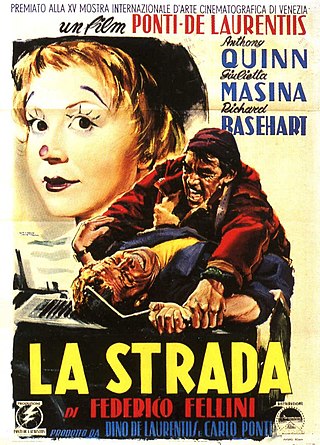
La strada is a 1954 Italian drama film directed by Federico Fellini and co-written by Fellini, Tullio Pinelli and Ennio Flaiano. The film tells the story of Gelsomina, a simple-minded young woman bought from her mother by Zampanò, a brutish strongman who takes her with him on the road.
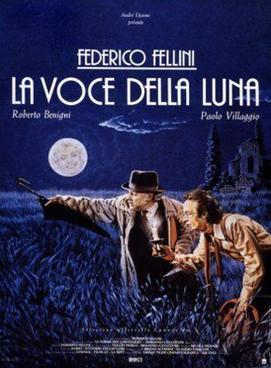
The Voice of the Moon is a 1990 Italian fantasy comedy film directed and written by Federico Fellini and starring Roberto Benigni, Paolo Villaggio, and Nadia Ottaviani. Based on the novel Il poema dei lunatici by Ermano Cavazzoni, and revisiting themes Fellini first explored in La strada (1954), the film is about a fake inspector of wells and a former prefect who wander through the Emilia-Romagna countryside of Fellini's childhood and discover a dystopia of television commercials, fascism, beauty pageants, rock music, Catholicism, and pagan ritual.

Andrea De Carlo is an Italian novelist. He has published almost two dozen novels, many of which have been translated.

Francesco Maselli, also known as Citto Maselli, was an Italian film director and screenwriter.
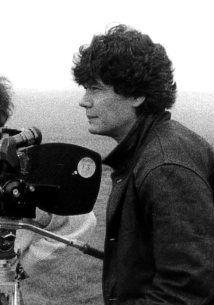
DamianPettigrew (1963) is a Canadian filmmaker, screenwriter, producer, author, and multimedia artist, best known for his cinematic portraits of Balthus, Federico Fellini, and Jean Giraud.

Tullio Kezich was an Italian screenwriter and playwright, best known as the film critic for Corriere della Sera and for his award-winning biography of Italian director Federico Fellini.

The 11th annual Venice International Film Festival was held from 20 August to 10 September 1950.

Roberto Andò is an Italian director, screenwriter, playwright and author.
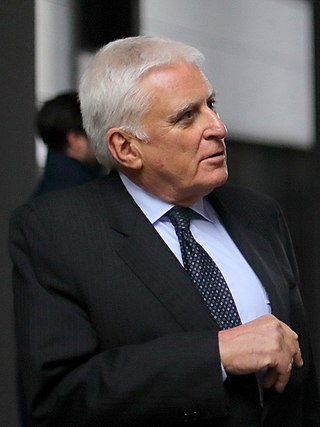
Paolo Vasile is an Italian businessman and film and television producer. He served as the CEO of Gestevisión Telecinco/Mediaset España from 1999 to 2022.
Roberto de Leonardis was Italian film script translator, film dialogue writer and film lyricist, best known for his long-lasting cooperation with the Walt Disney Company, being basically a monopolist in writing scripts for dubbing Disney's films into Italian, from the late 1940s to his death.



















